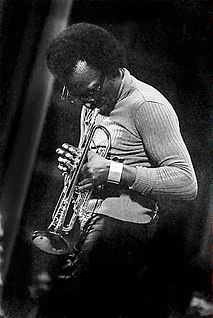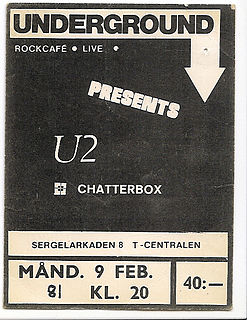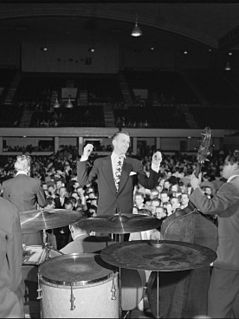This page is based on this
Wikipedia article Text is available under the
CC BY-SA 4.0 license; additional terms may apply.
Images, videos and audio are available under their respective licenses.
Rock music is a broad genre of popular music that originated as "rock and roll" in the United States in the early 1950s, and developed into a range of different styles in the 1960s and later, particularly in the United Kingdom and in the United States. It has its roots in 1940s and 1950s rock and roll, a style which drew heavily on the genres of blues, rhythm and blues, and from country music. Rock music also drew strongly on a number of other genres such as electric blues and folk, and incorporated influences from jazz, classical and other musical styles. Musically, rock has centered on the electric guitar, usually as part of a rock group with electric bass, drums, and one or more singers. Usually, rock is song-based music usually with a 4/4 time signature using a verse–chorus form, but the genre has become extremely diverse. Like pop music, lyrics often stress romantic love but also address a wide variety of other themes that are frequently social or political.
Instrumental rock is rock music that emphasizes musical instruments and features very little or no singing. Examples of instrumental rock can be found in practically every subgenre of rock, often from musicians who specialize in the style. Instrumental rock was most popular from the mid-1950s to mid-1960s, with artists such as Bill Doggett Combo, The Fireballs, The Shadows, The Ventures, Johnny and the Hurricanes and The Spotnicks. Surf music had many instrumental songs. Many instrumental hits came from the R&B world. Funk and disco produced several instrumental hit singles during the 1970s. The Allman Brothers Band feature several instrumentals. Jeff Beck also recorded two instrumental albums in the 1970s. Progressive rock and art rock performers of the 1960s and 1970s did many virtuosic instrumental performances.

Jazz fusion is a music genre that developed in the late 1960s when musicians combined jazz harmony and improvisation with rock music, funk, and rhythm and blues. Electric guitars, amplifiers, and keyboards that were popular in rock and roll started to be used by jazz musicians, particularly those who had grown up listening to rock and roll.
Popular music of the United Kingdom in the 1970s built upon the new forms of music developed from blues rock towards the end of the 1960s, including folk rock and psychedelic rock. Several important and influential subgenres were created in Britain in this period, by pursuing the limitations of rock music, including British folk rock and glam rock, a process that reached its apogee in the development of progressive rock and one of the most enduring subgenres in heavy metal music. Britain also began to be increasingly influenced by aspects of World music, including Jamaican and Indian music, resulting in new music scenes and subgenres. In the middle years of the decade the influence of the pub rock and American punk rock movements led to the British intensification of punk, which swept away much of the existing landscape of popular music, replacing it with much more diverse new wave and post punk bands who mixed different forms of music and influences to dominate rock and pop music into the 1980s.
Acid rock is a loosely defined type of rock music that evolved out of the mid-1960s garage punk movement and helped launch the psychedelic subculture. The style is generally defined by heavy, distorted guitars, lyrics with drug references, and long improvised jams. Its distinctions from other genres can be tenuous, as much of the style overlaps with '60s punk, proto-metal, and early heavy, blues-based hard rock.
An acid is any chemical compound that, when dissolved in water, gives a solution with a pH of less than 7.0.
German rock music (Deutschrock) came into its own only by the late 1960s, but spawned many bands spanning genres such as krautrock, Neue Deutsche Welle, heavy metal, punk, and industrial.
Italian rock is a form of rock music produced primarily in Italy. The music genre has roots in the country as it spread in the early 1960s from the United States with the earliest versions of rock and roll during this period being cover versions or interpretative covers of already existing songs.

Underground music comprises musical genres beyond mainstream culture. Any song that is not being legally commercialized is considered underground.
Adult-oriented rock may refer to:
Psychedelic music is a wide range of popular music styles and genres influenced by 1960s psychedelia, a subculture of people who used psychedelic drugs such as LSD, psilocybin mushrooms, mescaline and DMT to experience visual and auditory hallucinations, synesthesia and altered states of consciousness. Psychedelic music may also aim to enhance the experience of using these drugs.
Medieval folk rock, medieval rock or medieval folk is a musical subgenre that emerged in the early 1970s in England and Germany which combined elements of early music with rock music. It grew out of the British folk rock and progressive folk movements of the later 1960s. Despite the name, the term was used indiscriminately to categorise performers who incorporated elements of medieval, renaissance and baroque music into their work and sometimes to describe groups who used few, or no, electric instruments. This subgenre reached its height towards the middle of the 1970s when it achieved some mainstream success in Britain, but within a few years most groups had either disbanded, or were absorbed into the wider movements of progressive folk and progressive rock. Nevertheless, the genre had a considerable impact within progressive rock where early music, and medievalism in general, was a major influence and through that in the development of heavy metal. More recently medieval folk rock has revived in popularity along with other forms of medieval inspired music such as Dark Wave orientated neo-Medieval music and medieval metal.
Psychedelic may refer to:
Post-progressive is a type of rock music distinguished from vintage progressive rock styles, specifically 1970s prog. Post-progressive draws upon newer developments in popular music and the avant-garde since the mid-1970s. It especially draws from ethnic musics and minimalism, elements which were new to rock music. It is different from neo-progressive rock in that neo-prog pastiches 1970s prog, while "post-progressive" identifies progressive rock music that stems from sources other than prog.



